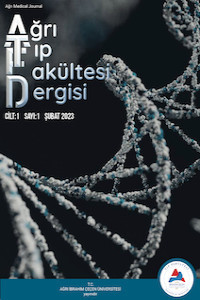COVID-19 Aşısı Yaptırmayan Bireylerin Sağlık Okuryazarlığı Düzeyi
COVID-19, Aşı, Sağlık Okuryazarlığı
Health Literacy Levels of Individuals not Vaccinated for COVID-19
COVID-19, Vaccine, Health Literacy,
___
- Öztürk Y. Public Health. Goals, aims and principles of public health. Erciyes University Press, Kayseri, Turkey; 2009.
- Öztek Z. Basic Health Services 1978-2018. Association of public health specialists. Edirne, Turkey; 2018
- World Health Organization (WHO) newsroom and spotlight: Ten threats to global health in 2019. Available from: https://www.who.int/news-room/spotlight/ten-threats-to-globalhealth-in-2019 Access Date: June 10, 2023
- Sallam M. COVID-19 Vaccine Hesitancy Worldwide: A Concise Systematic Review of Vaccine Acceptance Rates. Vaccines 2021; 160.
- Salali GD, Uysal MS. COVID-19 vaccine hesitancy is associated with beliefs on the origin of the novel coronavirus in the UK and Turkey. Psychol Med. 2020; 1-3.
- Sorensen K, Van den Broucke S, Fullam J, et al. Health literacy and public health: A systematic review and integration of definitions and models. BMC Public Health 2012; 12(80): 1-13.
- Adams RJ, Appleton SL, Hill CL, et al. Risks associated with low functional health literacy in an Australian population. Med J Aust 2009; 191: 530-534.
- Austvoll-Dahlgren A, Helseth S. What informs parents’ decision-making about childhood vaccinations? J. Adv. Nurs. 2010; 66: 2421-2430.
- Johri M, Subramanian SV, Sylvestre M, et al. Association between maternal health literacy and child vaccination in India: a cross-sectional study, J. Epidemiol Commun H. 2015;69(9):849-854.
- Veldwijk J, Heide I. van der, Rademakers J, et al. Preferences for vaccination: does health literacy make a difference? Med Decis Making. 2015, 38(8), 948-958.
- Wilson FL, Baker LM, Nordstrom CK, Legwand C. Using the teach-back and Orem’s selfcare deficit nursing theory to increase childhood immunization communication among lowincome mothers, Issues Compr Pediatr Nurs. 2008, 31(1), 7–22.
- Okyay P, Abacıgil F. Turkish Health Literacy Scales Reliability and Validity Study. Ministry of Health Press, Ankara Turkey; 2016.
- Durusu-Tanrıöver M, Yıldırım HH, Demiray-Ready FN, Çakır B, Akalın HE. Turkey Health Literacy Survey. Sağlık-Sen Press, Ankara, Turkey; 2014.
- Özkan, S, editors. Turkey Health Literacy Level and Related Factors Survey. 1st ed. Ministry of Health Press, Ankara; 2018.
- Güner AE, Şahin E, Peksu S, Kaya Şengü S, Güngör M. A study on determination health literacy level and identification of knowledge, manner, behavioral change and educational needs of elementary school teachers. Turkish Journal of Health Literacy 2020;1(1):58-76.
- Deniz S, Bentli R, Kalkanlı MT, et al. Determination of health literacy levels and related factors of teachers working in Malatya. Sakarya Med J. 2020;10(1):28-36.
- Malatyalı İ, Biçer EB. Determination of health literacy levels: The case of Sivas Cumhuriyet University. Ankara University Journal of Health Services. 2018;17(2):16-27.
- Doğan M, Özdemir F. The relationship between health literacy level of pregnant women and COVID-19 knowledge, attitudes and behaviors. Sakarya Med J. 2021;11(3):533-541.
- Doğan M, Çetinkaya F. The relationship of health literacy level with positive health behaviors in academicians. Journal of Health Sciences 2019; 28:135-141.
- Berkman ND, Sheridan SL, Donahue KE, Halpern DJ, Crotty K. Low health literacy and health outcomes: An updated systematic review. Ann Intern Med. 2011;155:97-107.
- Jovic-Vranes A, Bjegovic-Mikanovic V. Which women patients have better health literacy in Serbia? Patient Education and Counseling. 2012;89;209-212.
- Topsakal T, Ferik F. Approaches of news sites to Covid-19 vaccines and evaluation of news content. The Journal of Akdeniz University’s Faculty of Communication. 2021;35:370-386.
- Ball P. Anti-vaccine movement could undermine efforts to end coronavirus pandemic, researchers warn. Nature. 2020;581(7808):251.
- Durmaz N, Hengirmen E. The dramatic increase in anti-vaccine discourses during the COVID-19 pandemic: a social network analysis of Twitter. Hum Vaccin Immunother. 2022;18(1):e2025008.
- Gölbaşı SD, Metintaş S. COVID-19 Pandemic and infodemia. ESTUDAM Public Health Journal. 2020;5:126-37.
- Guess AM, Nyhan B, O’Keeffe Z, Reifler J. The sources and correlates of exposure to vaccinerelated (mis)information online. Vaccine. 2020;38(49):7799-805.
- Genç Ç. Information sources, media usage habits and attitudes towards vaccination in the COVID-19 pandemic. Journal of Akdeniz University Faculty of Communication. 2021; 36:178-202.
- Kinali G, Örgev BK, Örgev C, Topal B, Şahin H. A study on vaccine literacy and hesitance reflected on life in the COVID-19 pandemic, vaccine rejection and anti-vaccine opposition. Eur J Sci Technol. 2022;38:462-472.
- Mete B, Doğan Mete E, Kanat C, Pehlivan E, Demirhindi H. Factors affecting COVID-19 vaccine hesitancy: An online survey study in Turkey. ESTUDAM Public Health Journal. 2022;7(1):73-82.
- Harlak H, Elmas P, Eyiol G, Mert S, Öner Ş. The effects of death salience and fear of COVID-19 on COVID-19 vaccine opposition: A Quasi-experimental Study. Nesne Psikoloji Dergisi 2022,10(25),399-417.
- Başlangıç: 2023
- Yayıncı: Ağrı İbrahim Çeçen Üniversitesi
Nadir Bir Hastalık: İzole Renal Glukozüri
Antikoagülan Kullanımına Bağlı Akut Karın Ağrısının Nadir Bir Nedeni: Spontan Rektus Kılıf Hematomu
Vefa ATIŞ, Rıfat PEKSÖZ, Sultan Tuna AKGOL GUR
Çocukluk Çağında Benign Trombositopeni ve Yeni TURBB1, ANKRD26 ve SAMD9 Varyantları
Hatice Mine ÇAKMAK, Yaşar BİLDİRİCİ
Tiroid Bezinin Klinik Özellikleri Erken Yaşlılık ve İhtiyarlık Döneminde Farklılık Gösterir mi?
Hatice HAMARAT, Göknur YORULMAZ
Kronik Gerilim Tipi Baş Ağrısı Profilaksisinde Amitriptilin ve Essitolopramın Karşılaştırılması
Fuat ŞENTÜRK, Murat KARTAL, Erdem KARADENİZ, Müfide Nuran AKÇAY
Castleman Hastalığı Hakkındaki Klinik Tecrübemiz: Tek Merkez Deneyimi
Müzeyyen ASLANER AK, Doğancan YILMAZ, Şehmus ERTOP
COVID-19 Aşısı Yaptırmayan Bireylerin Sağlık Okuryazarlığı Düzeyi
